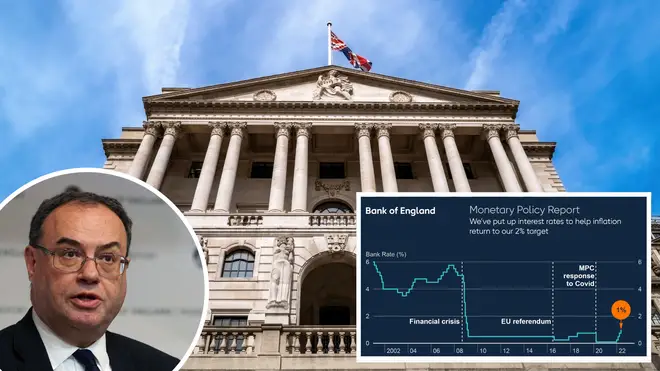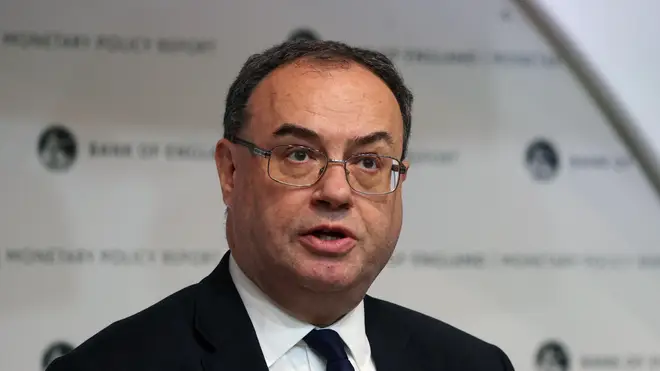
Iain Dale 10am - 1pm
5 May 2022, 12:03 | Updated: 5 May 2022, 14:24

Interest rates have hit a 13-year high as the Bank of England raised the base rate to 1% to try and control spiralling inflation which is set to breach 10% this year.
In a further blow to struggling families, Bank governor Andrew Bailey announced that rates would rise 0.25% rise from 0.75% - the fourth consecutive increase since December.
Members of the Bank's nine-strong Monetary Policy Committee voted 6-3 to increase rates from 0.75% to 1% - the fourth time they have voted for a rise in a row and taking rates to a level not seen since 2009.
Three members called for a bigger increase to 1.25% due to worries over rocketing inflation, with the Bank ramping up its forecast for Consumer Prices Index (CPI) inflation to rise from 7% currently to over 10% in October - its highest level for 40 years - due to soaring energy prices.
The Bank has warned inflation is set to peak at over 10% this year and forecast the economy will contract in 2023, by 0.25% against the 1.25% growth it.
The Bank's MPC - which sets interest rates - said: "Global inflationary pressures have intensified sharply following Russia's invasion of Ukraine.
"This has led to a material deterioration in the outlook for world and UK GDP growth."
Read more: 'Nothing is forgotten': Klitschko shares 'horrifying' scenes of rape and murder in Ukraine
We expect inflation to fall next year, and be close to our 2% target in around two years. https://t.co/h3ewfvAPYp #MonetaryPolicyReport #Inflation pic.twitter.com/hKEip0Ot9f
— Bank of England (@bankofengland) May 5, 2022
The UK is set to narrowly miss a technical recession, as defined by two quarters in a row of falling gross domestic product (GDP), but the Bank forecasts very weak quarterly growth in 2023 and a contraction as a whole next year, with GDP falling by 0.25% and unemployment picking up sharply as cost pressures hit hard.
The prediction for growth in 2022 remains unchanged at 3.75%, although the Bank also slashed its growth outlook for 2024 to 0.25% from the 1% it predicted in February.
Sky-high inflation will see household disposable income plunge by 1.75% this year - the second highest on record - while overall real income will tumble by an unprecedented 3.25% this year and fall again in 2023 before beginning to recover, the Bank cautioned.
In minutes of the latest decision, the Bank said further rate hikes will likely be needed to cool rampant inflation.
Governor Andrew Bailey has recently warned the Bank is "walking a very tight line" between tackling inflation and avoiding a recession.
Read more: Queen pulls out of this year's royal garden parties, Buckingham Palace says
The Monetary Policy Committee voted to raise #BankRate to 1%. Find out more in our #MonetaryPolicyReport: https://t.co/h3ewfvAPYp pic.twitter.com/I5q7mliWza
— Bank of England (@bankofengland) May 5, 2022
Read more: Rachel Riley reveals she caught male celebrity secretly upskirting her at party
Jason Hollands, managing director of Bestinvest, said: "Rising borrowing costs have implications for the way investors assess businesses and in this respect, 'growth' companies in sectors like technology and communication services are particularly vulnerable.
"That's because investors assess these companies primarily on the basis of projections of future earnings, rather than their profits today, so when rising borrowing costs and inflation create greater uncertainty about the future value of money, investors revise their view of what such companies should be valued at.

"On the flipside, some businesses are a lot more resilient to the current environment. Banks can actually benefit from rising interest rates, energy companies are a major component of inflation and some businesses offer hard-to-replicate products and services that customers cannot do without, so are able to pass on cost increases without sacrificing profit margins.
"The UK market has more than its fair share of such businesses and so the UK stock market has held up relatively well so far this year. In the environment we are in, solid companies with conservatively financed balance sheets that are able to churn out attractive dividends should be on investors' radars.
"In recent years these have often been overlooked by investors as boring, but it is time to take another look."

Martin Lewis demands political intervention on energy prices
Suren Thiru, head of economics, at the British Chambers of Commerce (BCC), said: "The decision to raise interest rates will cause considerable alarm among households and businesses given the rapidly deteriorating economic outlook and mounting cost pressures many are facing.
"The Bank of England faces an unenviable trade-off between soaring inflation and a wilting economy.
"However, higher interest rates will do little to address the global headwinds and supply constraints driving this inflationary surge.
"It also raises the risk of recession by damaging confidence and intensifying the financial squeeze on businesses and consumers."
Whilst Paul Johnson, director of the Institute For Fiscal Studies, warned of the impact on people's mortgages of an expected interest rates hike by the Bank of England on Thursday.
The update sent the pound, which had been positive against other major currencies earlier in the day, sharply lower.
The pound was 0.8% lower at 1.240 against the US dollar and it was 0.9% lower at 1.174 against the euro.